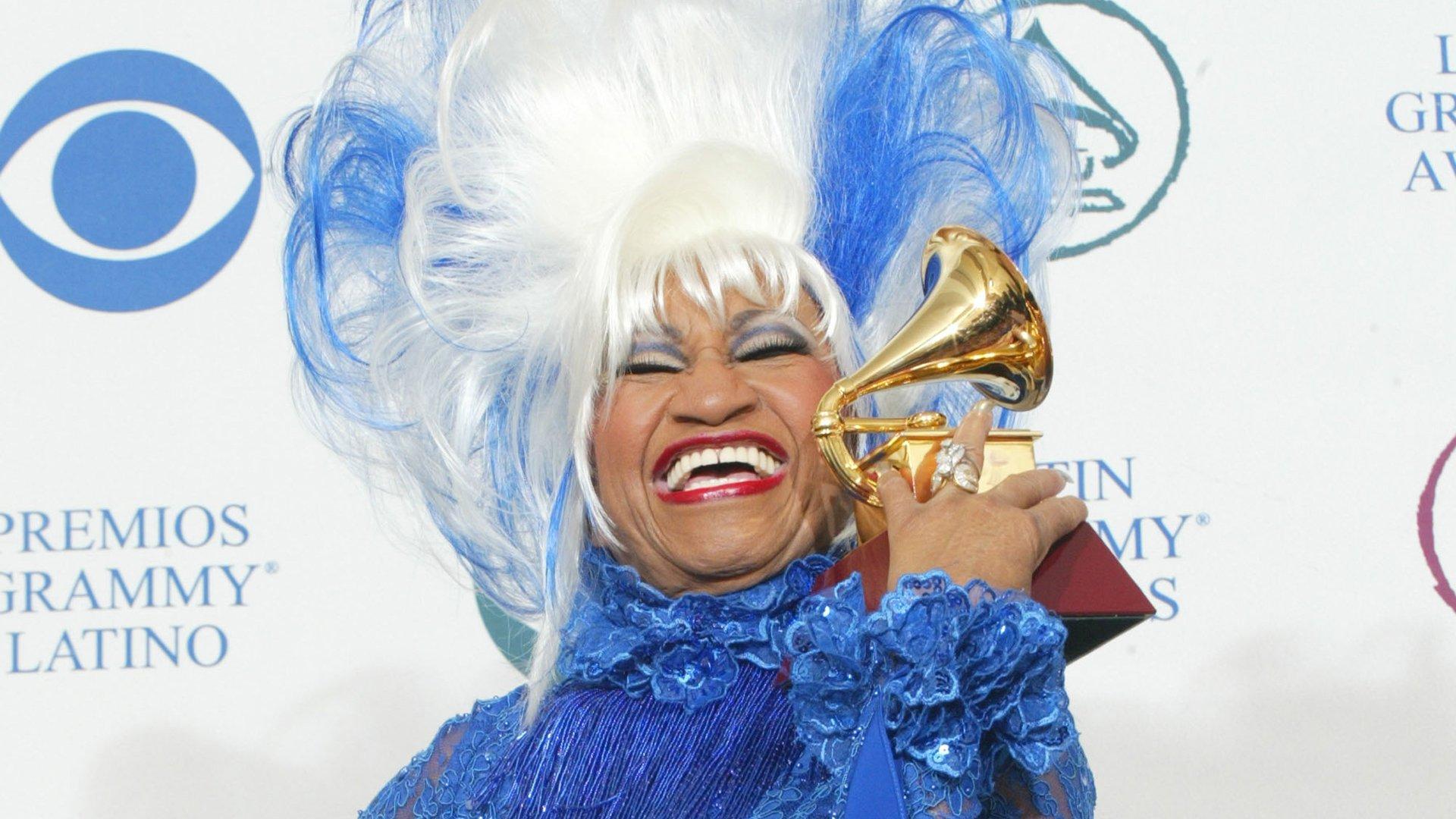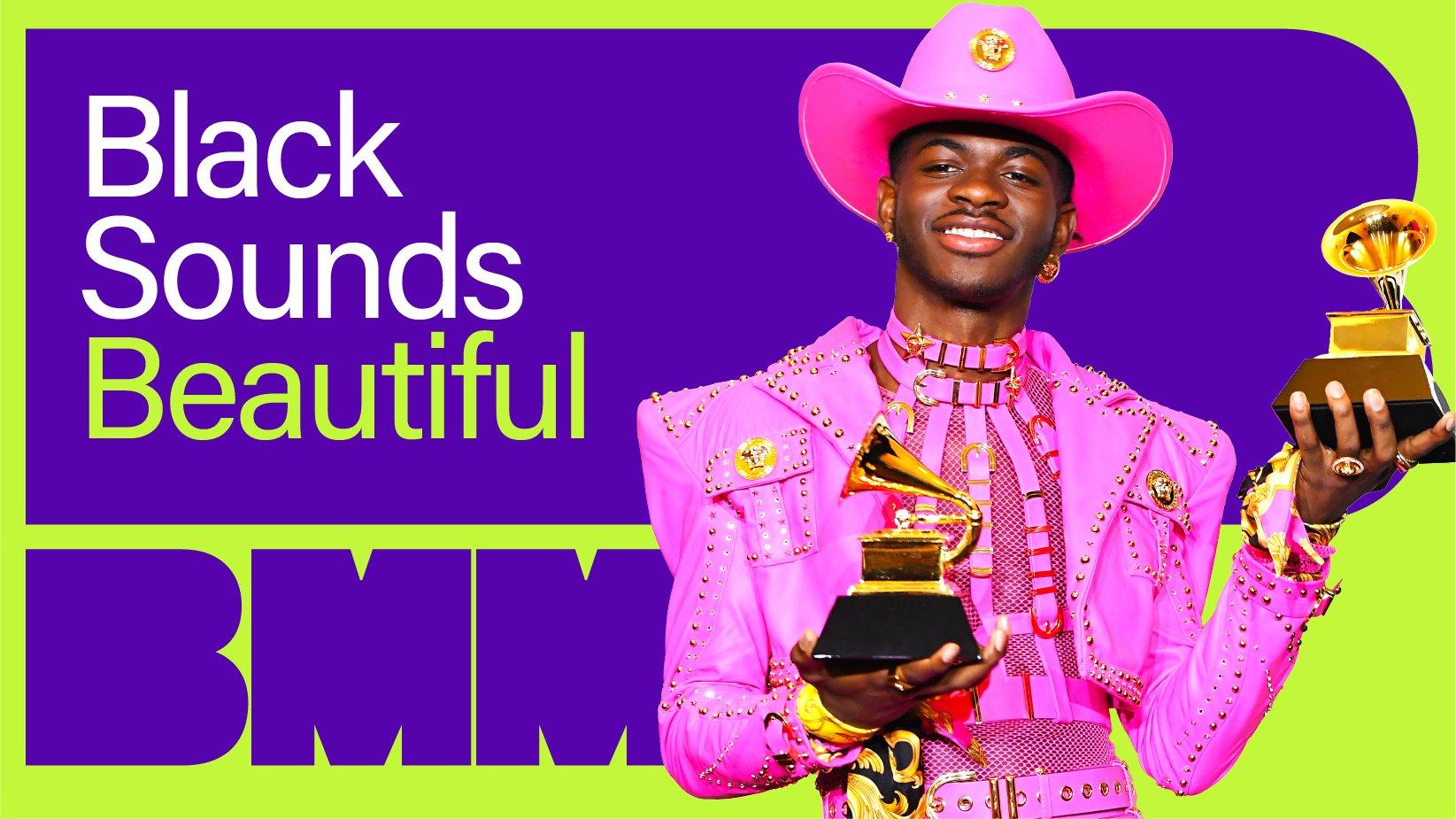Photo: Frederick Brown via Getty Images

Celia Cruz
news
Black Sounds Beautiful: How Celia Cruz's Talent, Drive & Personality Crowned Her The "Queen of Salsa"
The latest edition of Black Sounds Beautiful doubles as a lesson in royal history—as it explores the career of Celia Cruz, the "Queen Of Salsa"
When the term music royalty is thrown around, most people think of the King of Rock and Roll (Elvis Presley), the King of Pop (Michael Jackson) or Queen Bey (Beyoncé). Still, there's a seat at the royal table labeled "Queen of Salsa", and it's reserved for the one and only Celia Cruz.
With a career spanning over half a century, Cruz was known for her electrifying personality and unrivaled work ethic, releasing 23 certified Gold albums overall. That special blend of personality and production only multiplied when placed inside a genre as appropriate as salsa.
Watch the latest episode of Black Sounds Beautiful below to learn how the Queen of Salsa claimed her throne.
Her hard work didn't go unnoticed, as she earned 14 GRAMMY nominations, three GRAMMY wins and four Latin GRAMMY wins.
Check down below to learn about even more incredible stories of Black artistry from GRAMMY.com's Black Sounds Beautiful series.
Celia Cruz, Tito Puente, Willie Colon & More Salsa Legends Get Special Vinyl Reissues

Photo: Kito Muñoz
interview
Nathy Peluso Is 'Grasa': How Hard-Earned Lessons, The Mafia & A Lost Album Led To Her Most Vulnerable Work
Both honest and brash, Nathy Peluso's first album in four years is the culmination of therapy and deep musical work. "It’s important to bring that energy to the music, like, rude, strong, dangerous," she says.
Those who follow underground Spanish music have known the name Nathy Peluso for a while, but in 2020 the Argentine-Spanish artist came to the attention of a broader audience. That year, the rapper and singer released her official debut album Calambre, which won a Latin GRAMMY for Best Alternative Album and received a GRAMMY nomination for Best Latin Rock or Alternative Album in 2021.
Four years later, Peluso is back with Grasa [Grease]. Out May 24, the 16 track follow-up is simultaneously bolder, more vulnerable and more revealing than its predecessor, crystalizing the artist's iconoclastic and often cinema-inspired vision.
At Legacy Records, a hotspot for haute Mediterranean fare in Manhattan's Hudson Yards neighborhood, Nathy is draped in an oversized blazer and pants. She looks like a relaxed, elegant CEO and the style becomes her, especially as she balances it with ultra-feminine touches. Today, its long nails tipped in fire-engine red.
Her fashion choices are as pointed as her manicure, on and off stage. In the recent video for "Aprender a Amar," she raps ferociously into a mirror, sharply dressed in a pin-stripe tie, a jacket with exaggerated shoulders, and delicate black lace gloves. These sartorial choices ask, Why settle for a mob-wife aesthetic when you can be a don yourself?
Both visually and aurally, Nathy Peluso is part cinematic diva and part underworld kingpin, with a fair amount of Missy Elliott swagger. Her tough, independent persona was on full display on her now-multimillion streamed 2020 Bizarrap session, which smoldered and crackled with her bombast. It was fully formed on "Business Woman," from Calambre, and returned with a roar on her 2021 single "Mafiosa," a high drama salsa track.
Her powerful energy is pure hip-hop in steel-toe Timbs, but she performs with the generous spirit of a burgeoning pop star ministering to a big house of fans. On Grasa, Nathy Peluso brings humanity to her braggadocio. This doesn’t stop her from picking up the mafia saga where she left off on Calambre. The opening track is titled "Corleone."
Ahead of the release of her first album in four years, Nathy Peluso spoke with GRAMMY.com about overcoming creative burnout, taking inspiration from mob movies, and the true meaning of "grasa."
This album is more personal than your previous releases. What led you to open up more lyrically?
I think it just happened because I am growing. I am learning and I need to tell my truth. The way for me to do that is music. It’s been four years, but, when the moment came, I was ready.
Speaking of four years ago, 2020 was a very big year for you. A lot happened. What are your most vivid memories from that time?
Calambre was the moment. It was really special for me. Winning the GRAMMY was the moment, and then touring with that album was an amazing learning experience for me. I grew up on the stage.
I grew up as a woman, as an artist, as a performer, maybe as a lover too. You are traveling around the world with so much pressure. Physically, it was a difficult show. I was alone on stage, with my musicians, but no dancers. It was a challenge.
I grew up in so many ways, but when I finished that tour I was broken. My soul was broken. I was empty. I started looking for myself. It was very tough.
It sounds like you were experiencing creative burnout.
Yes, my brain was broken, but it was necessary in order to start again. I did an album then, but I decided not to go with that album and to start again. So, it was a very long path.
You wrote a whole album and then discarded it? What wasn’t working about it?
It was working, but it wasn’t the feelings I wanted to share and the music I wanted to share. Sometimes there are projects whose purpose is just to learn from. It was a process of learning for me. That was a very special moment.
You start feeling like a failure, but no. It was necessary to go through that to get to Grasa. The things I learned were exactly the things I needed to know to then make this music.
So, how did you overcome this period of burnout and get to the point where you were feeling creative again?
A lot of therapy. A lot of working on my s— and confronting it.
Is there one song on Grasa that is more intense to perform, or more emotional for you than the others?
"Envidia" is talking real s—. Things happen around you and you need to know who you are and what your intention is. You have to be focused on what you want to bring to the world and not care about anything besides your craft. People are going to talk. Things are going to be crazy. You’ve got to know your choice, your path.
Can you tell me about the song "Corleone"? How do gangster movies inspire you?
I have a song called "Mafiosa." It’s a character I love to perform and I see myself in that character. It’s relatable. The mafia have codes that represent me — not everything [laughs] — but, you know, the family, the legacy, working hard, respect. That kind of feeling in music, in cinema, is what I was looking for. I love the aesthetic. I love Tarantino. I love Tony Montana, the character. On stage, I feel like him sometimes.
I love for a woman to be that type of character. I think it’s interesting. Usually, those kinds of feelings in music or cinema are represented by men. It’s always that way in salsa. If you look at Celia or Gloria, they were always more romantic. Maybe La Lupe was dangerous. For me, it’s important to bring that energy to the music, like, rude, strong, dangerous. Be careful, bitch!
What were some of your specific musical influences while working on this album?
Always folklore and roots, salsa and bolero, but then I was paying attention to Kendrick Lamar and Kanye West. They are a big inspiration for me.
How do you bridge the gap, or find the connections among your different influences?
I don’t even know. I just do music, really. I go to the studio and I start singing. I just feel it. I go to the studio, and suddenly I want to sing, and I want to cry. And then another day, I feel powerful and I want drama and aggressive stuff. It’s very honest. The starting point is always the way I feel.
Is it important to you to make music that empowers other women?
Yes. For sure. But it wasn’t ever a strategy, like, "I want to do music for empowering women." I just did my music without direction. Then I discovered people were feeling the power and using it. I feel inspired by that, but it wasn’t the point.
What does the word "grasa" mean to you?
I chose that word because it’s the strongest word. It’s dirty. It’s funky. But it’s a word that, at least in Spanish, has a lot of meanings. So, I want people to choose the meaning. After listening to the album, you can choose the meaning and maybe redefine it with the album.
How Danna Paola Created 'CHILDSTAR' By Deconstructing Herself

Photo: Jeff Kravitz/FilmMagic
list
10 Facts About Latin Music At The GRAMMYs: History-Making Wins, New Categories & More
For decades, Latin music has been an indispensable part of the GRAMMYs landscape. Ahead of the 2024 GRAMMYs nominations, here are some milestones in Latin music at Music’s Biggest Night.
The 2024 GRAMMY nominations are right around the corner — and as always, inspired Latin musical offerings will lie within the heart of the list.
While the Recording Academy’s sister academy, the Latin Recording Academy, naturally honors this world most comprehensively, it plays a crucial role in the GRAMMYs landscape just as in that of the Latin GRAMMYs — and there’s been crossover time and time again!
On Nov. 10, the world will behold nominations in all categories — including several within the Latin, Global, African, Reggae & New Age, Ambient, or Chant field. Within the world of Latin music, the awards are: Best Latin Pop Album, Best Música Urbana Album, Best Latin Rock or Alternative Album, Best Música Mexicana Album (Including Tejano), and Best Tropical Latin Album. The Recording Academy also offers a GRAMMY Award for Best Latin Jazz album, though that award is a part of a different field.
Like the Recording Academy and GRAMMYs themselves, these categories have evolved over the years. Along the way, various Latin music luminaries have forged milestones in Academy history.
Ahead of the 2024 GRAMMYs nominations, here are some key facts to know about Latin music’s history at the GRAMMYs.
The First Award For Latin Music At The GRAMMYs Was Given In 1975
The first winner for Best Latin Recording was pianist and composer Eddie Palmieri, for 1974’s The Sun of Latin Music. Now an eight-time GRAMMY winner, Palmieri took home the golden gramophone in this category at both the 1976 GRAMMYs and the following year for Unfinished Masterpiece.
At the 1980 GRAMMYs, the first group winner was the thrice nominated Afro-Cuban jazz band Irakere, for their 1978 self-titled debut.
Percussionist Mongo Santamaria holds the record for the most nominations within the Best Latin Recording category.
The Sound Of Latin Pop — And The Title Of The Award — Has Shifted Over 40 Years
Back in 1983, this category was called Best Latin Pop Performance. The first winner was José Feliciano, who took home the golden gramophone for his album Me Enamoré at the 26th GRAMMY Awards.
Best Latin Pop Performance eventually pivoted to Best Latin Pop Album and Best Latin Pop or Urban Album, then back to Best Latin Pop Album — just another example of how the Academy continually strives for precision and inclusion in its categories.
As for most wins, it’s a tie between Feliciano and Alejandro Sanz, at four. Feliciano also holds the distinction of having two consecutive wins, at the 1990 and 1991 GRAMMYs.
The Best Latin Urban Album Category Was Introduced In 2007
The first winner in this category was the urban hip-hop outfit Calle 13, for their 2007 album Residente o Visitante.
The first female nominee was Vanessa Bañuelos, a member of the Latin rap trio La Sinfonia, who were nominated for Best Latin Urban Album for their 2008 self-titled album at the 2009 GRAMMYs.
Here’s Who Dominated The Best Norteño Album Category
The first GRAMMY winner in the Best Norteño Album category was Los Tigres Del Norte, for their 2006 album Historias Que Contar, at the 2007 GRAMMYs. To date, they have landed four consecutive wins — at the 2007, 2008, 2009, and 2010 GRAMMYs.
The Intersection Between Latin, Rock & Alternative Has Shifted
Best Latin Rock Or Alternative Album; Best Latin Rock, Alternative Or Urban Album; Best Latin Rock/Alternative Performance… so on and so forth.
If that’s a mouthful, again, that shows how the Academy continually hones in on a musical sphere for inclusion and accuracy’s sake.
Within this shifting category, the first winner was Los Fabulosos Cadillacs, who won Best Latin Rock/Alternative Performance for 1997’s Fabulosos Calavera at the 1998 GRAMMYs.
At the 2016 GRAMMYs, there was a tie for the golden gramophone for Best Latin Rock, Urban Or Alternative Album, between Natalia Lafourcade and Pitbull. Overall, the most wins underneath this umbrella go to Maná, with a total of three.
These Artists Made History In Tropical Latin Categories
Over the years, this component of Latin music has been honored with GRAMMYs for Best Traditional Tropical Latin Performance, Best Traditional Tropical Latin Album, Best Tropical Latin Performance, and Best Tropical Latin Album.
The first winner of a GRAMMY for Best Tropical Latin Performance was Tito Puente & His Latin Ensemble, for "On Broadway," from the 1983 album of the same name.
Under the same category, the first female winner was Celia Cruz, for "Ritmo En El Corazón." Overall, Rubén Blades has taken home the most GRAMMYs under this umbrella, with a total of six.
This Was The First Latin Artist To Win Album Of The Year
Ten-time GRAMMY winner and 14-time nominee Carlos Santana holds this distinction for 1999’s "Supernatural," at the 2000 GRAMMYs.
This Was The First Spanish-Language Album To Be Nominated For Album Of The Year
That would be Bad Bunny’s Un Verano Sin Ti, at the 2023 GRAMMYs; Bad Bunny also performed at the ceremony, but Harry Styles ended up taking home that golden gramophone.
Ditto Música Mexicana — Formerly Known As Best Regional Mexican Music Album
Música mexicana — a broad descriptor of regional sounds, including Tejano — is having a moment in recent years, which points to the incredibly rich GRAMMYs legacy of these musical worlds.
The first winner for Best Mexican-American Performance was Los Lobos, for 1983’s "Anselma." For Best Regional Mexican or Tejano Album, that was Pepe Aguilar, for 2010’s "Bicentenario."
The Inaugural Trophy For Best Música Urbana Album Went To…
The one and only Bad Bunny, for 2020’s El Último Tour Del Mundo. He took home the golden gramophone again at the 2023 GRAMMYs for Un Verano Sin Ti.
Keep checking back as more information comes out about the 2024 GRAMMYs — and how the Recording Academy will honor and elevate Latin genres once again!

Photo: Jeff Kravitz/FilmMagic
video
GRAMMY Rewind: Kendrick Lamar Honors Hip-Hop's Greats While Accepting Best Rap Album GRAMMY For 'To Pimp a Butterfly' In 2016
Upon winning the GRAMMY for Best Rap Album for 'To Pimp a Butterfly,' Kendrick Lamar thanked those that helped him get to the stage, and the artists that blazed the trail for him.
Updated Friday Oct. 13, 2023 to include info about Kendrick Lamar's most recent GRAMMY wins, as of the 2023 GRAMMYs.
A GRAMMY veteran these days, Kendrick Lamar has won 17 GRAMMYs and has received 47 GRAMMY nominations overall. A sizable chunk of his trophies came from the 58th annual GRAMMY Awards in 2016, when he walked away with five — including his first-ever win in the Best Rap Album category.
This installment of GRAMMY Rewind turns back the clock to 2016, revisiting Lamar's acceptance speech upon winning Best Rap Album for To Pimp A Butterfly. Though Lamar was alone on stage, he made it clear that he wouldn't be at the top of his game without the help of a broad support system.
"First off, all glory to God, that's for sure," he said, kicking off a speech that went on to thank his parents, who he described as his "those who gave me the responsibility of knowing, of accepting the good with the bad."
Looking for more GRAMMYs news? The 2024 GRAMMY nominations are here!
He also extended his love and gratitude to his fiancée, Whitney Alford, and shouted out his Top Dawg Entertainment labelmates. Lamar specifically praised Top Dawg's CEO, Anthony Tiffith, for finding and developing raw talent that might not otherwise get the chance to pursue their musical dreams.
"We'd never forget that: Taking these kids out of the projects, out of Compton, and putting them right here on this stage, to be the best that they can be," Lamar — a Compton native himself — continued, leading into an impassioned conclusion spotlighting some of the cornerstone rap albums that came before To Pimp a Butterfly.
"Hip-hop. Ice Cube. This is for hip-hop," he said. "This is for Snoop Dogg, Doggystyle. This is for Illmatic, this is for Nas. We will live forever. Believe that."
To Pimp a Butterfly singles "Alright" and "These Walls" earned Lamar three more GRAMMYs that night, the former winning Best Rap Performance and Best Rap Song and the latter taking Best Rap/Sung Collaboration (the song features Bilal, Anna Wise and Thundercat). He also won Best Music Video for the remix of Taylor Swift's "Bad Blood."
Lamar has since won Best Rap Album two more times, taking home the golden gramophone in 2018 for his blockbuster LP DAMN., and in 2023 for his bold fifth album, Mr. Morale & the Big Steppers.
Watch Lamar's full acceptance speech above, and check back at GRAMMY.com every Friday for more GRAMMY Rewind episodes.
10 Essential Facts To Know About GRAMMY-Winning Rapper J. Cole

Photo: Steve Granitz/WireImage
video
Black Sounds Beautiful: How Lil Nas X Turned The Industry On Its Head With "Old Town Road" And Beyond
In this episode of Black Sounds Beautiful, relive Lil Nas X's massive debut, "Old Town Road," and learn how he's since been an advocate for Black and LGBTQIA+ communities through his music and his platform.
Lil Nas X became a global sensation practically overnight, but it wasn't an accident.
The American singer and rapper — born Montero Lamar Hill — became fluent in music and pop culture at an early age, becoming a meme aficionado. His love for internet culture cultivated the perfect recipe for his debut single, "Old Town Road," to become one of the most viral hits in music history; the song also prompted a necessary conversation about the bounds of genre.
"Old Town Road" rose to the top of the Billboard Hot 100 chart, and still holds the record for most time spent at No. 1 at 19 weeks. The single later helped Lil Nas X snag two GRAMMY Awards for Best Pop/Duo Group Performance and Best Music Video. (To date, he's won 2 GRAMMYs and has received 11 nominations overall.)
Aside from his immense musical talent, Lil Nas X — who came out as gay on social media during his Hot 100 reign — has been a fierce champion for LGBTQIA+ and Black communities.
"It's just acceptance of gay people. And they see that as a bad thing, like, They're trying to normalize it. You know what? Yeah. That's actually what I'm trying to do," he told GQ in 2021.
At just 24 years old, Lil Nas X has plenty more history-making and game-changing moves in store. As he revealed during his March 2023 campaign with Coach, "My next big chapter is coming."
Press play on the video above to learn more about Lil Nas X's industry-altering career, and check back to GRAMMY.com for more new episodes of Black Sounds Beautiful.
The Evolution Of The Queer Anthem: From Judy Garland To Lady Gaga & Lil Nas X
